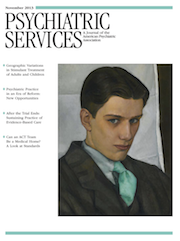Patient-Clinician Agreement on Treatment Type and Helpfulness: Results From a WTC Rescue and Recovery Worker Cohort
Abstract
Objective
This study assessed patient and clinician agreement about treatment type and its association with treatment helpfulness among World Trade Center rescue and recovery workers.
Methods
A total of 187 outpatients and 280 clinicians completed a survey, which gathered information on patient characteristics, treatment types, and treatment helpfulness. Kappa statistics and sensitivity and specificity analyses were used, and the association between patient-clinician agreement and reported treatment benefit was determined.
Results
Patient-clinician agreement was highest for group therapy, medication management, eye movement desensitization and reprocessing, and couples therapy. Agreement about medication management, individual psychotherapy, and workers’ compensation evaluation was associated with higher reported treatment benefits.
Conclusions
Findings support the hypothesis that agreement regarding treatment type is associated with higher reported benefit and extend findings of previous studies to a linguistically diverse, naturalistic sample exposed to a disaster trauma. Results also highlight the need for better understanding of eclectic therapies offered in real-world clinical practice.



